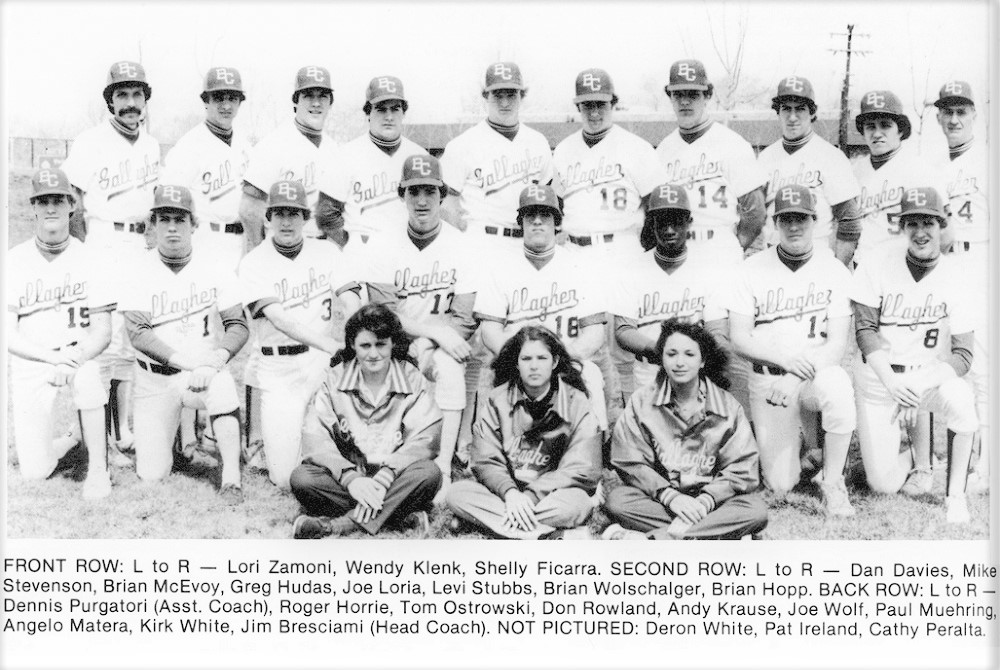
Flashback 1981: 3 Days Finally Yields 4 Baseball Champions
By
Ron Pesch
MHSAA historian
April 30, 2021
The nursery rhyme “Rain, Rain Go Away” has often served as unofficial anthem for the MHSAA’s baseball tournament, first held in the spring of 1971.
A decade after the start, downpours again turned a planned Saturday-sprint-to-the-finish into a three-day-marathon that finally wrapped up on Tuesday, June 16, 1981.
In the end, the 10th MHSAA Boys Baseball Tournament did feature a few ‘firsts.’ The finish of the season marked the first year that championship games for each of the Association’s four classes were scheduled for play at a single site. Previous championship action saw each class play its title game in a different city across the state.
Alumni Field at Central Michigan University served as host. Home of the Chippewas, the site served as an impressive backdrop, as the stadium had been recently renovated thanks to fundraising work by Mount Pleasant insurance businessman Jack Weisenburger, who had played five years of professional baseball in the Boston Braves organization, and nationally-known beloved sportscaster Dick Enberg, a CMU alumnus.
CLASS A
Roger Horrie’s 10th-inning two-out hit up the alley in left center scored freshman pinch runner Deron White from third base, giving Harper Woods Bishop Gallagher a 7-6 walk-off victory over Flint Carman.
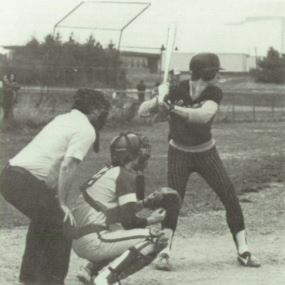 The smash, coming off Jeff Hamilton’s two-ball, two-strike pitch, was welcome relief to Lancers coach Jim Bresciami, whose team had stranded 17 runners on base prior to the game winner. Gallagher had loaded the bases in both the seventh and ninth innings, but was unable to score.
The smash, coming off Jeff Hamilton’s two-ball, two-strike pitch, was welcome relief to Lancers coach Jim Bresciami, whose team had stranded 17 runners on base prior to the game winner. Gallagher had loaded the bases in both the seventh and ninth innings, but was unable to score.
“Roger is our best bunter,” Bresciami told Detroit Free Press sportswriter Mick McCabe, “but we already had a man thrown out at the plate on a bunt so we just let him swing away, and the good Lord let it drop.” Horrie had walked three times and bunted twice earlier in the game.
The contest, twice postponed because of storms, was finally played on Tuesday.
Hamilton (who later played for the Los Angeles Dodgers from 1986-91) starred for Carman, notching three RBI on a triple in the top of the fifth inning to give Carman a 5-3 lead. Kirk White’s two-run homer for Gallagher in the bottom of the inning tied the game at five each. Darrin Lum doubled in the sixth for Carman, then scored on a single by Pat Richard to make it 6-5 before Don Rowland (later a member of University of Miami’s 1982 and 1985 NCAA championship baseball teams and a draft pick of the Detroit Tigers) tripled then scored following a sacrifice bunt by Andy Krause, again knotting the score.
With the win, Gallagher became Michigan’s first Class A team to repeat as champion, while Bresciami became the state’s first coach in Class A to win two titles.
Bresciami compiled a 545-149 record over 21 seasons at the school before retiring following the 1985 season. His teams earned three runner-up finishes (B-1974, B-1977, A-1984) and three Finals titles (A-1971, A-1981, A-1985). In addition, Gallagher returned to the Class B title game in 1986, falling to Battle Creek Lakeview, 4-3, under coach Bob Hadacz, a four-year assistant to Bresciami. Gallagher then won another crown in Class B in 1989, coached by Thomas Trompics.
CLASS B
On Monday, Bay City All Saints required only five innings to grab its second baseball title, trouncing Tecumseh 7-1. The Cougars had previously won the 1978 crown in Class C.
Tecumseh scored first, loading the bases in the top of the second inning and pushing a run across on Rex Robinson’s one-out single to grab a 1-0 lead. But it was all All Saints to follow. The Cougars responded in the bottom of the inning with an RBI single by Mark Berent, then added two more with Mike McIlhargey’s 385-foot home run shot to bump the score to 3-1. Catcher G.J. Zanotti added a solo homer in the third inning, then All Saints scored twice more in the fourth and again in the fifth. The game was called under MHSAA rules after three downpours made the field unplayable. Dave Laprairie went the distance for the win.
“For many on the team,” noted the Bay City Times years later, “their biggest game was not the state final win over Tecumseh. … To them, the real highlight was their semifinal against Mount Pleasant that was played in Bay City's Veterans Park before a crowd of nearly 3,000 people.” Mount Pleasant had finished as runner-up in Class B a year previous, and took All Saints – the top-ranked team in the Michigan High School Baseball Coaches Association (MHSBCA) regular-season final poll – to extra innings before surrendering, 10-7.
Following the postseason, All Saints shortstop Keith Miller was named to the MHSBCA Class B first-team all-state squad. (Miller would later play college baseball at Oral Roberts University, then carve out a nine-year career in the Major Leagues playing five seasons with the New York Mets and four with the Kansas City Royals.)
CLASS C
Allen Park Cabrini grabbed a 9-8 win over Buchanan in a thriller. It was the second title in three years for the Monarchs and coach Donald Oboza.
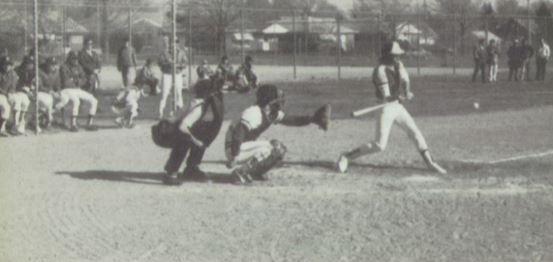 Suspended in the third inning on Saturday with Cabrini leading 1-0, the game was resumed Monday. Cabrini added four more runs in the inning for a quick 5-0 lead. Buchanan scored twice in the bottom of the third, and then tied the contest at 5-5 in fourth, highlighted by a John Ehlert home run.
Suspended in the third inning on Saturday with Cabrini leading 1-0, the game was resumed Monday. Cabrini added four more runs in the inning for a quick 5-0 lead. Buchanan scored twice in the bottom of the third, and then tied the contest at 5-5 in fourth, highlighted by a John Ehlert home run.
The Monarchs jumped out to a 9-5 lead before storms delayed play for another hour and 35 minutes entering the seventh inning. When the game resumed, Buchanan rallied for three runs in dramatic fashion to pull within one.
“With (Buchanan) runners at first and second and no one out,” wrote Jack Walkden in the St. Joseph Herald-Palladium, “the Bucks John Ehlert hit a long drive up the alley in right-centerfield. But (Cabrini centerfielder John) Stanko went far to his left to haul down the drive over his shoulder. The play proved even more important when two of the next three Buchanan batters collected hits. If Ehlert’s drive had gotten through, Buchanan probably would have at least tied the game.”
“That guy made a heckuva play on Ehlert’s ball,” said Buchanan coach Bob Storm. “That was the ballgame.”
Cabrini’s senior righthander Tony DeMarti, “who several times left his shortstop position to pitch” due to the MHSAA’s rule that forbid one hurler from pitching more than a combined 30 outs over 10 innings in the Semifinals and Final, was “brought … back to the mound (in the seventh),” according to McCabe, “where he eventually ended the threat …”
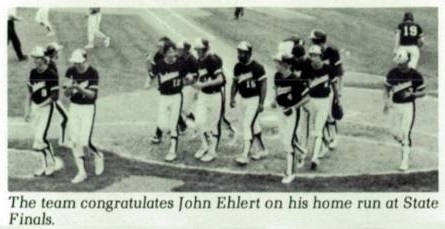 Cabrini first baseman Mike McKelvey finished with a single and a double, driving in three runs. Stanko notched a single and a double, scored twice and added an RBI on the day for the Monarchs. DeMarti, who had scored the eventual game winner, also earned the victory in relief – his eighth win in 12 decisions on the year.
Cabrini first baseman Mike McKelvey finished with a single and a double, driving in three runs. Stanko notched a single and a double, scored twice and added an RBI on the day for the Monarchs. DeMarti, who had scored the eventual game winner, also earned the victory in relief – his eighth win in 12 decisions on the year.
Cabrini finished with a 29-11 mark. Buchanan’s 27-5 record was the school’s best to date.
CLASS D
In the only game to finish as scheduled at CMU, Reading’s Randy Spangler (13-1) pitched a complete game, scattering five hits as the Rangers downed Mesick, 1-0.
The run came in the top of the first inning as catcher Mike Shoemaker walked, moved to second on a sacrifice by Jon Keger, and then scored on an error when Spangler’s grounder to deep short was thrown away.
Paul Ruskowski walked and stole second for Mesick in the bottom of the seventh inning, but was left on base. Coach Jack Kerspilo’s Rangers ended the year with a 26-3 record. Starter Chris McNitt took the loss for Mesick, which finished the season at 23-4.
 Ron Pesch has taken an active role in researching the history of MHSAA events since 1985 and began writing for MHSAA Finals programs in 1986, adding additional features and "flashbacks" in 1992. He inherited the title of MHSAA historian from the late Dick Kishpaugh following the 1993-94 school year, and resides in Muskegon. Contact him at [email protected] with ideas for historical articles.
Ron Pesch has taken an active role in researching the history of MHSAA events since 1985 and began writing for MHSAA Finals programs in 1986, adding additional features and "flashbacks" in 1992. He inherited the title of MHSAA historian from the late Dick Kishpaugh following the 1993-94 school year, and resides in Muskegon. Contact him at [email protected] with ideas for historical articles.
PHOTOS: (Top) Harper Woods Bishop Gallagher claimed the Class A baseball title in 1981, its second championship in the sport. (2) Future Dodgers infielder Jeff Hamilton waits on a pitch for Flint Carman in Class A. (3) John Stanko takes a cut for Allen Park Cabrini in the Class C title game. (4) Buchanan celebrates a homer by John Ehlert. (Photos collected by Ron Pesch.)
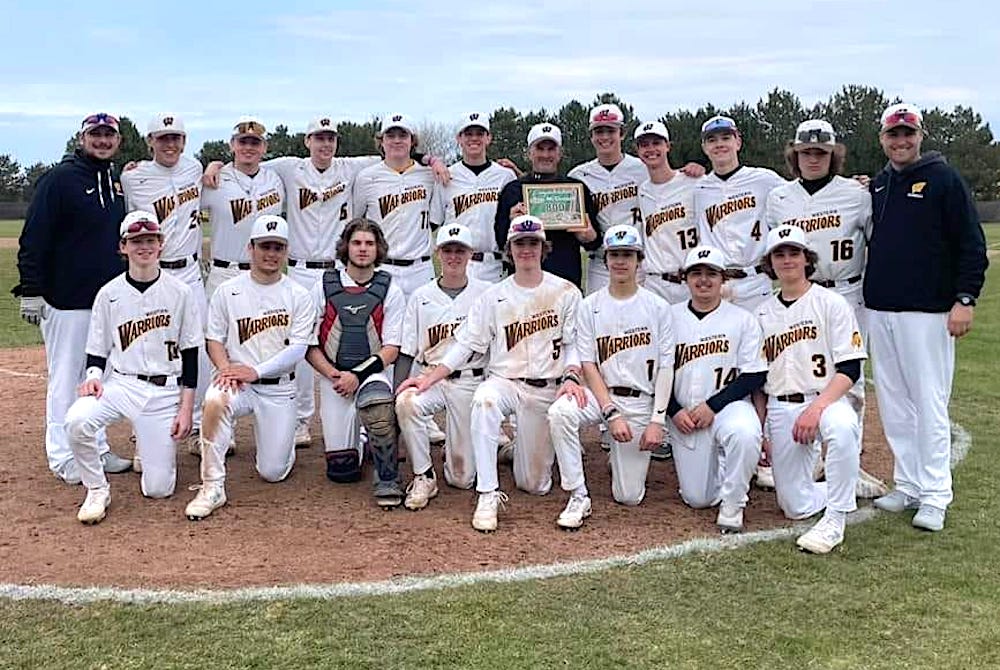
BC Western Writing Storybook Season with Celebrations, Early Success
By
Paul Costanzo
Special for MHSAA.com
April 26, 2023
Before a single pitch was thrown this season, there was plenty for the Bay City Western baseball program to be excited about.
 Some of it was historic: Coach Tim McDonald entered the year three wins away from 800 in his career, and, during the season, the program is set to celebrate the 10-year anniversary of the 2013 Division 1 championship team.
Some of it was historic: Coach Tim McDonald entered the year three wins away from 800 in his career, and, during the season, the program is set to celebrate the 10-year anniversary of the 2013 Division 1 championship team.
But the present was just as exciting.
Led by a strong group of seniors that started a program rebuild in 2021, the Warriors figured to have one of their strongest teams in years.
Then the pitches started getting thrown, and the excitement may have been kicked up a notch.
Western is 14-0 to start the season, and living up to its lofty expectations in a year where it just feels like everything is already a celebration.
“It’s kind of freaky the way it’s kind of lining up right now,” said senior pitcher Ben Kohany. “We have our goals in mind, but we’re still taking it game by game. Obviously, there is that pressure (from the program’s past success), but we’re just trying to take things slowly.”
Western’s success on the field this season is the result of a simple formula: good pitching, solid defense and the ability to manufacture runs.
It’s a formula that helps the Warriors to focus on what’s directly in front of them, and not look ahead when they have big postseason goals that could otherwise distract them.
“We just play together as a team – we trust each other, make plays and get the job done,” junior catcher Bryce Neitzel said. “Every day in practice we work on the fundamentals. Especially with bunting, we do a station of bunting every day. I feel like it does help, because whenever we’re in a situation in a game, we’re prepared for the moment. We kind of expect it.”
It’s also a formula that has won McDonald and the Warriors a lot of games over his 31 years as a coach – 811, to be exact.
“We have a philosophy, things we emphasize and things we work on,” McDonald said. “We’re kind of known for our small ball, and we kind of got away from that. This year’s team, one of the many things they understand is that at some point, that’s going to become important. They’re just rock solid. They’re a good practice team, and that translates.”
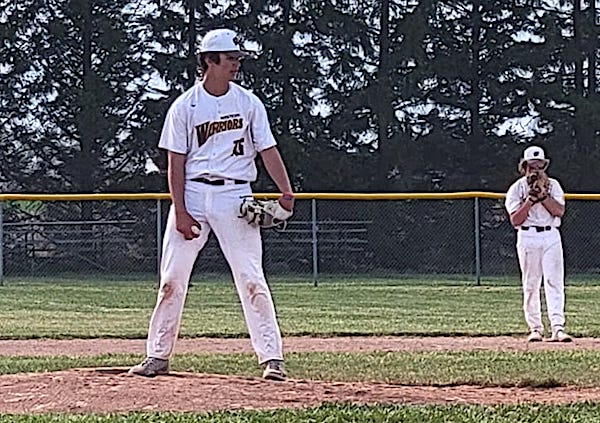 When the season began, McDonald had 797 career wins, which put him 12th on the MHSAA’s all-time list. It took just three games, and a bit of serendipity, to become the 11th coach in state history to reach 800.
When the season began, McDonald had 797 career wins, which put him 12th on the MHSAA’s all-time list. It took just three games, and a bit of serendipity, to become the 11th coach in state history to reach 800.
The Warriors swept Flushing in their season-opening doubleheader, which gave McDonald the chance to get win No. 800 against his alma mater, Mount Pleasant Sacred Heart, in a game that was a late addition to the schedule.
And just to make it a little more personal, Sacred Heart is coached by Earl Hartman, who coached McDonald and is one of the 10 ahead of him on the all-time list; and McDonald’s nephew, Joe McDonald, was the starting pitcher for the Irish.
“It sounds like a Hollywood script, but that’s just how it all fell into place,” McDonald said. “It was certainly a neat day, and that just added to it.”
While McDonald knew how close he was to the milestone coming into the season, he wasn’t planning on making a big deal of it. The people around him, of course, had other plans.
“They had cupcakes, and my AD got a plaque made for me,” McDonald said. “Somebody did some work behind the scenes, and all of that is appreciated. I’m proud to represent this program. If me, as the head coach, has a lot of wins, that means the school has a lot of wins. I’ve been fortunate to be in a good baseball community. They had good baseball before I came. I’m proud of the foundation that we built, and I think it’s just continued on.”
Getting to be part of that historic moment was a thrill for the current Western players.
“That was super cool,” senior third baseman Miles Yurgaites said. “That’s a lot of wins. It was a super cool moment, and a super fun day.”
The timing was also great for the Warriors, and not just because of the opponent in Game 3 of the season.
“I’m glad it happened early in the season,” McDonald said. “We got to enjoy the moment, and now we can move onto some of our goals that we set for ourselves. That worked out in a good way, as well. Now this team, they’ve become focused, because we still got a lot of work ahead of us. They’re staying humble in their approach, and every one of them knows they have some things they can get better at. As a coach, that’s all you can ask.”
Helping McDonald drive home that message is a trio of assistants who are Western alumni: Brian Patrick, Brendan “Bubba” Harrison and Brandon Wise. Patrick has been on the staff for 12 years, while Harrison (2013) and Wise (2014) were each part of Finals championship teams for the Warriors.
Not only does that give McDonald the luxury of coaching with people who know how a championship program is run, it also gives the Western players a daily look at what it takes to get back there.
“It does help,” Neitzel said. “They have all that experience, and they’ve shared all their memories with us. It makes us want to do what they did.”
 Paul Costanzo served as a sportswriter at The Port Huron Times Herald from 2006-15, including three years as lead sportswriter, and prior to that as sports editor at the Hillsdale Daily News from 2005-06. He can be reached at [email protected] with story ideas for Genesee, Lapeer, St. Clair, Sanilac, Huron, Tuscola, Saginaw, Bay, Arenac, Midland and Gladwin counties.
Paul Costanzo served as a sportswriter at The Port Huron Times Herald from 2006-15, including three years as lead sportswriter, and prior to that as sports editor at the Hillsdale Daily News from 2005-06. He can be reached at [email protected] with story ideas for Genesee, Lapeer, St. Clair, Sanilac, Huron, Tuscola, Saginaw, Bay, Arenac, Midland and Gladwin counties.
PHOTOS (Top) Bay City Western celebrates coach Tim McDonald's 800th win April 8. (Middle) The Warriors play in the Bay County Invitational on April 15. (Photos courtesy of the Bay City Western baseball program.)

